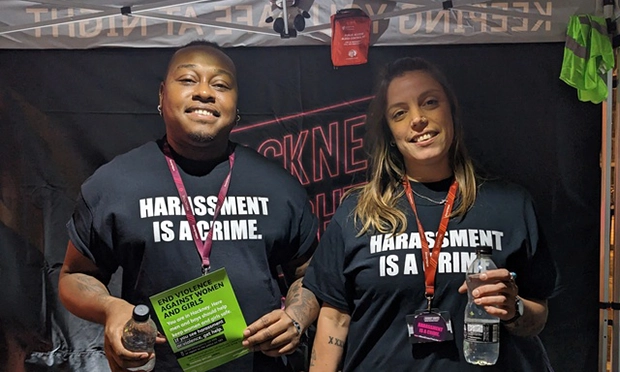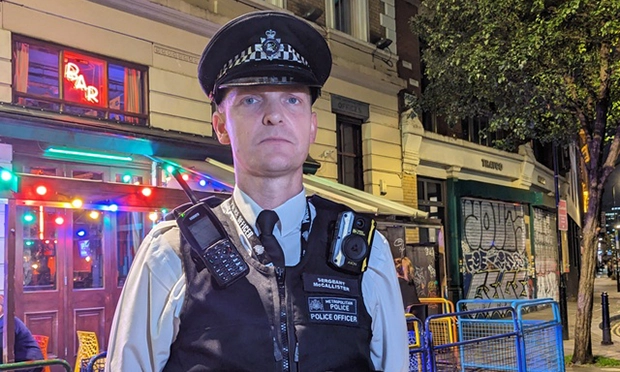Council and police launch new campaign against harassment and misogyny in Shoreditch

Hackney Nights manager Sam Mathys (right) with support worker Miguel Campbell-Lewis. Photograph: Julia Gregory
“People just flock here to Shoreditch,” said Sam Mathys, who works with bars and clubs to help people have a safe night out.
She is the manager of Hackney Nights, a council scheme designed to ensure that accredited venues provide protection for customers and staff.
Mathys is now helping the Town Hall launch its Don’t Cross the Line campaign against harassment and misogyny.
The campaign includes posters on the Central line, inside venues, and on the streets, and there are staff out and about in Shoreditch.
Mathys and her team visit venues weekly to talk about any issues and give advice.
Shoreditch has a reputation as one of the biggest late-night economies in the UK as it has a large concentration of venues, with some open until 4am.
Mathys said: “We work very closely with venues, and we have a good relationship with them.”
As she was setting up a welfare tent on Great Eastern Street, she explained to the Citizen that nearly half of Shoreditch’s late-night visitors arrive from outside London.
Council staff and police will give out advice, water, and snacks on busy weekends this autumn and winter as part of the Don’t Cross the Line campaign.
There are even flip flops for those whose shoes have proved too uncomfortable, and anti-spiking bottle tops for drinks.

Actin inspector for Shoreditch, Leon McCallister. Photograph: Julia Gregory
Leon McCallister, acting police inspector for Shoreditch town centre and licensing, said: “It’s about early engagement, being out there and talking to people.
“Sexual touching won’t be tolerated by the police, it won’t be tolerated by the local authority, and it won’t be tolerated by venues.”
He added: “What we want to make clear is that women can come out and have a good night out in Shoreditch.”
At a briefing at the start of the shift, Sergeant Adnaan Ahmed told police and council staff about a suspected case of drink-spiking the night before, and asked them to stay vigilant.
Miguel Campbell-Lewis is a late-night levy support worker for the council.
He explained that sometimes late-night revellers need to take a few moments from the hustle and bustle or just need to speak to someone.
“People also stop because they want information about how to get home,” he added.
A passing woman, who gave her name as Gloria, said: “I’ve just been to a friend’s birthday. I’ve never really felt comfortable in this area of London.”
She described how she had experienced catcalling, where someone shouted harassing comments at her, whilst she was waiting for a bus.
Cllr Gilbert Smyth, who chairs some of Hackney Council’s licensing hearings, including some for Shoreditch venues, joined the late-night team.
He was keen to hear more about their work and chat to some of those on a night out.
One group told him they had travelled from Essex to celebrate their friend’s birthday and would use the Night Tube to get home.
“It is good to see the support people are given when they need it and to talk to them about having a safe night out,” Smyth said.
Several people who had drunk a bit too much were treated in the medical tent.
Emergency care assistant Lloyd Wells said: “We deal with vulnerable people in general. People can feel unwell, they may have been assaulted or just need someone to talk to. We have mental health first aid training as well.”
As he prepared for the busy hour when venues close, McCallister said: “We want people to feel confident that they can talk to us, and that we will not tolerate harassment and for them to see that we are tackling the problem.”
